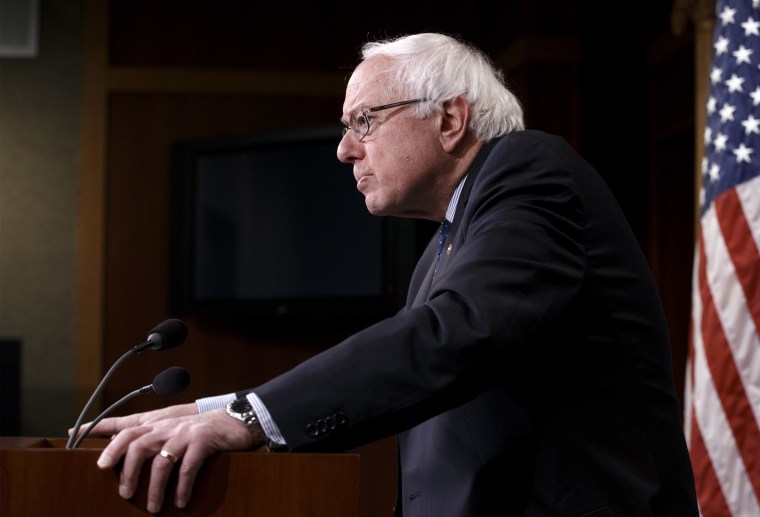By all appearances, former Secretary of State Hillary Clinton is the prohibitive favorite for the Democratic presidential nomination in 2016, but as of today, she's not running unopposed. Sen. Bernie Sanders (I-Vt.) is
throwing his hat in the ring.
Sanders, who plans to formally announce his 2016 campaign on Thursday, told the Associated Press and USA Today that he's running. "I am running for president," he told the AP. "I've been traveling around the country for the last year trying to ascertain whether there really is grass-roots support in terms of people standing up and being prepared to take on the billionaire class," Sanders elaborated to USA Today. "I believe that there is."
A formal announcement is expected later today, along with a D.C. press conference.
Sanders has already begun making the media rounds this morning, striking a
very optimistic tone during an ABC interview. "I think we're going to have a surprise for you: we're going to win this thing," the Vermont independent said, adding, "People should not underestimate me."
For those who've followed the senator closely, that's probably good advice, though it's hard to deny the fact that he has an uphill climb ahead -- one national poll conducted last week showed Sanders trailing Clinton among Democratic voters by a mere 52 points,
60% to 8%.
But for Sanders, who's long embraced the "socialist" label, the long odds are hardly a deterrent.
One of the key details that's important to remember today is that Bernie Sanders has nothing to lose. He's not up for re-election until 2018 -- he won a second term in 2012 with 71% of the vote -- so launching a national campaign this year costs him nothing.
In fact, for the senator, there's no downside whatsoever to hitting the campaign trail, bringing his policy agenda to a larger audience, enjoying the national spotlight, sparring in some debates, and possibly even nudging Clinton to the left.
Is Sanders going to win the Democratic presidential nomination? It's extremely unlikely. Is that what his campaign is all about? Probably not.
There is one nagging issue, though, that's likely to come up in the coming months: Sanders is running in a Democratic primary despite not being an actual Democrat. In the Senate, the Vermonter caucuses with Dems, but is officially an independent. That remains true today -- Sanders' office has made it quite clear that, despite his bid for national office, the senator has not changed his party affiliation, is still not a Democrat, and remains a proud independent.
Indeed, Sanders has never been a Democrat -- as the multi-term mayor of Burlington, he was a member of a small, state-based party, and as a multi-term U.S. House member, Sanders was a member of Vermont's Progressive Party. (In recent years, the state Democratic Party has had no interest in running candidates against Sanders, so Dems formally nominate Sanders as their Senate candidate, and he then declines that nomination.)
As a procedural matter, there's
no rule that says only Democrats can seek the Democratic nomination, but as a practical matter, it may add an additional challenge for Sanders while appealing to Democratic diehards.
So
why run in a Democratic primary at all?
An independent candidacy could be appealing because of "huge frustration at both parties." But the drawback was, he said, that it's very difficult to get on the ballot in 50 states. And he emphasized that he would never run as a spoiler if it could lead to the election of a Republican president — "we've made that mistake in the past." On the other hand, if he ran as a Democrat, he said, "It's easier to get on the ballot, you can get into the debates, and the media will take you more seriously." The disadvantage? "People are not overwhelmingly enthusiastic about the Democratic Party."
It's not a secret that the Democratic establishment is enthusiastic about Clinton, but DNC Chair Rep. Debbie Wasserman Schultz nevertheless issued a statement this morning welcoming Sanders to the race.
"Democrats welcome Vermont Senator Bernie Sanders as the second candidate to officially seek the Democratic Party's nomination for President in 2016." Wasserman Schultz said. "Senator Sanders is well-recognized for his principled leadership and has consistently stood up for middle class families. Throughout his service in the U.S. House and Senate, Bernie Sanders has clearly demonstrated his commitment to the values we all share as members of the Democratic Party."
